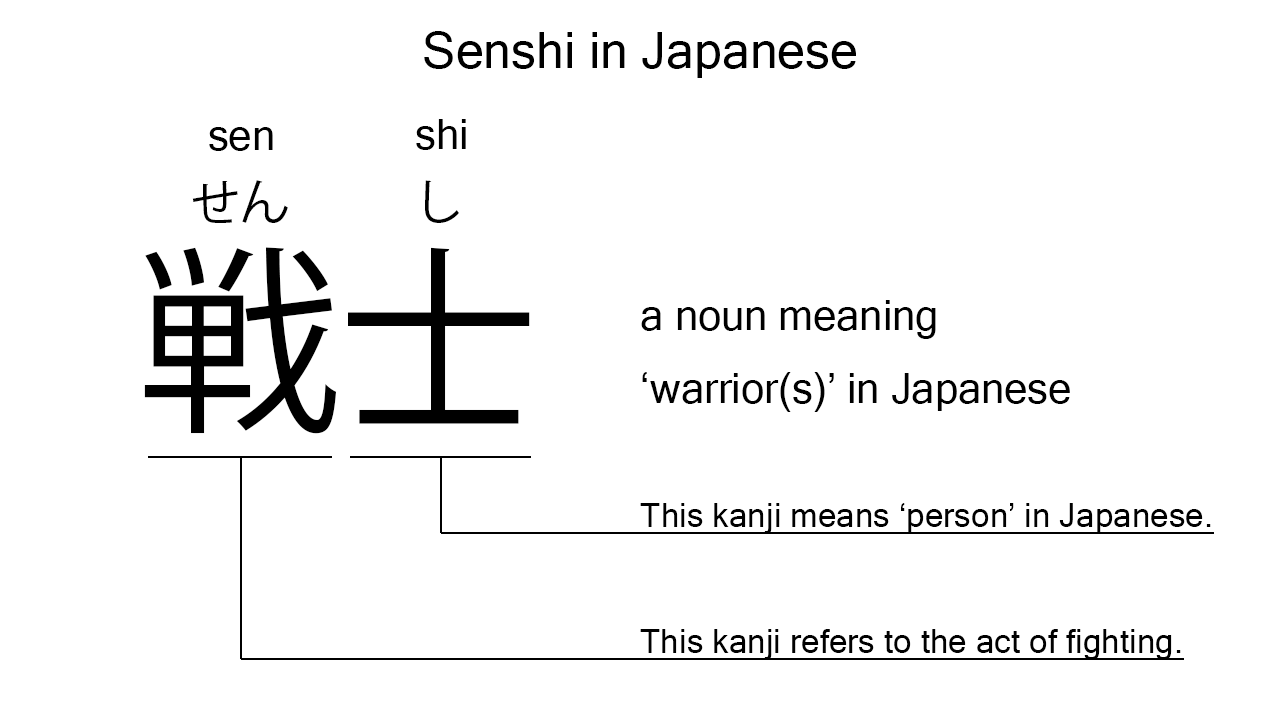What does “senshi” mean in Japanese?
There are some homophones, but native speakers say “senshi” normally to mean ‘warrior’ in Japanese. Perhaps, some Japanese learners know this word as it is sometimes used in Japanese movies, video games, songs, novels, manga, anime, and the like. In this blog post, however, I will explain this word in detail based on its kanji expression. And also, I will explain how to use it through example sentences. My explanations would help Japanese learners understand “senshi” more clearly. Then, let’s get started!
Contents
Definition and meanings of “senshi”
Let me start with the definition and meanings of “senshi”.
- senshi – 戦士 (せんし) : a noun meaning ‘warrior’ in Japanese. This can also work as plural. Learn more about Japanese plural. Depending on the context and situation, this can also mean ‘soldier’ in Japanese.
Japanese native speakers use this noun to refer to a person or people fighting for something. So, the usage is similar to those of the English nouns written above, I think.
The definition and meanings are simple and clear. To understand this noun more clearly, however, let me explain its kanji characters in detail, one by one.
What does “senshi” literally mean in Japanese?
The kanji expression of “senshi” consists of the following two kanji characters:
- 戦 : a kanji character used to refer to the act of fighting. This can also be found in other words like “tatakau” and “sensou“.
- 士 : a kanji character used to mean ‘person’ or ‘member’ in Japanese.
These two kanji characters tell us that the formed noun literally means a ‘fighting person’ in Japanese. This literal interpretation is very close to the actual meanings.

When we meet new kanji expressions, we should check their kanji characters in detail to understand their meanings clearly and deeply. In many cases, kanji characters tell us a lot about the meanings of the expressions they form. Actually, here, we could get the better understanding of “senshi” through the detailed kanji check above.
So far, I’ve explained the definition and meanings of “senshi” together with its kanji characters. Then, let me explain how to use it through the example sentences below.
Example #1: how to say “warrior” in Japanese
kanojo wa hikari no senshi desu – 彼女は光の戦士です (かのじょはひかりのせんしです)
She is a warrior of light.
Below are the new words used in the example sentence.
- kanojo – 彼女 (かのじょ) : a pronoun meaning ‘she’ in Japanese.
- wa – は : a binding particle working as a case marker or topic marker. In the example, this works after “kanojo” to make the subject in the sentence.
- hikari – 光 (ひかり) : a noun meaning ‘light’ in Japanese.
- no – の : a case particle joining two nouns. Normally, the first one can work as a modifier to describe the second. In the example, this works to join “hikari” and “senshi”. The formed phrase literally means ‘a warrior of light’ in Japanese. Word orders in Japanese and English are different, but the role of this case particle is very similar to that of the English preposition, “of”.
- desu – です : an auxiliary verb used after a noun or adjective to make it polite. Probably, this is well known as a part of Japanese desu form. In the example, this is used after the noun phrase, “hikari no senshi”, to make it sound polite.
This is a typical usage of “senshi”. In this example, it works as a part of the noun phrase, “hikari no senshi”, to mean ‘a warrior of light’ in Japanese.
Example #2: another usage of “senshi”
soshite boku tachi ga yami no senshi desu – そして僕達が闇の戦士です (そしてぼくたちがやみのせんしです)
And we are warriors of darkness.
Below are the new words used in the example sentence.
- soshite – そして : a conjunction meaning ‘and’ in Japanese.
- boku – 僕 (ぼく) : a pronoun meaning ‘I’ in Japanese. This is used mainly by boys and young males.
- tachi – 達 (たち) : a suffix used after a noun or pronoun to make its plural form. In the example, this is used after “boku” to make its plural form, “boku tachi”, which means ‘we’ in Japanese.
- ga – が : a case particle used to make the subject word or the object word in a sentence. In the example, this is used after “boku tachi” to make the subject in the sentence.
- yami – 闇 (やみ) : a noun meaning ‘darkness’ in Japanese.
This is another typical usage of “senshi”. In this example, it works as plural to mean ‘warriors’ in Japanese. When we want to refer to people fighting for something in Japanese, anyway, this noun is a good option.
Summary
In this blog post, I’ve explained the definition and meanings of “senshi” in detail based on its kanji expression. And also, I’ve explained how to use it through the example sentences. Let me summarize them as follows.
- senshi – 戦士 (せんし) : a noun meaning ‘warrior’ in Japanese. This can also work as plural. Depending on the context and situation, this can also mean ‘soldier’ in Japanese. Native speakers use this noun to refer to a person or people fighting for something. So, the usage is similar to those of the English nouns written above. These two kanji characters literally mean a ‘fighting person’ in Japanese. This literal interpretation is very close to the actual meanings.
Hope my explanations are understandable and helpful for Japanese learners.